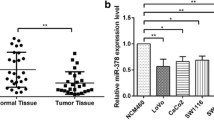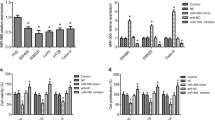Abstract
Purpose
Previous studies have found that miR-23a-3p, a diagnostic marker for colon cancer (CC), is upregulated in primary CC from stage I/II patients. Nevertheless, the specific functions and molecular mechanisms of miR-23a-3p in colon cancer remain unclear.
Methods
The expression levels of miR-23a-3p and NDRG4 were analyzed by western blot and RT‒qPCR assays. Cell viability and proliferation were measured by CCK8 and colony formation assays. Cell apoptosis was assessed by flow cytometry. Cell migration and invasion were detected by transwell assay. Target binding was detected by luciferase reporter assay.
Results
miR-23a-3p was dramatically elevated in CC tissues and cells. In HT29 and SW480 cells, downregulation of miR-23a-3p hampered cell proliferation, migration, and invasion while increasing cell apoptosis. The effects of miR-23a-3p silencing on CC progression were slowed by NDRG4 downregulation.
Conclusions
miR-23a-3p promoted CC progression by modulating the expression of NDRG4. This study demonstrated the mechanism of miR-23a-3p in CC, which may offer a new target for CC therapy.




Similar content being viewed by others
References
Qu JJ, Qu XY, Zhou DZ. miR-4262 inhibits colon cancer cell proliferation via targeting of GALNT4. Mol Med Rep. 2017;16(4):3731–6.
Zhao J, Chen Y, Liu F, Yin M. Overexpression of miRNA-143 inhibits colon cancer cell proliferation by inhibiting glucose uptake. Arch Med Res. 2018;49(7):497–503.
Mattiuzzi C, Sanchis-Gomar F, Lippi G. Concise update on colorectal cancer epidemiology. Ann Transl Med. 2019;7(21):609.
Aguiar Junior S, Oliveira MM, Silva DRME, Mello CAL, Calsavara VF, Curado MP. Survival of patients with colorectal cancer in a cancer center. Arq Gastroenterol. 2020;57(2):172–7.
Pizzini S, Bisognin A, Mandruzzato S, Biasiolo M, Facciolli A, Perilli L, et al. Impact of microRNAs on regulatory networks and pathways in human colorectal carcinogenesis and development of metastasis. BMC Genomics. 2013;14:589.
Wang D, Xin L, Lin JH, Liao Z, Ji JT, Du TT, et al. Identifying miRNA-mRNA regulation network of chronic pancreatitis based on the significant functional expression. Medicine. 2017;96(21):e6668.
Yang H, Lin J, Jiang J, Ji J, Wang C, Zhang J. miR-20b-5p functions as tumor suppressor microRNA by targeting cyclinD1 in colon cancer. Cell Cycle. 2020;19(21):2939–54.
Hetta HF, Zahran AM, Shafik EA, El-Mahdy RI, Mohamed NA, Nabil EE, et al. Circulating miRNA-21 and miRNA-23a expression signature as potential biomarkers for early detection of non-small-cell lung cancer. Microrna. 2019;8(3):206–15.
Ding L, Gu H, Xiong X, Ao H, Cao J, Lin W, et al. MicroRNAs Involved in carcinogenesis, prognosis, therapeutic resistance and applications in human triple-negative breast cancer. Cells. 2019;8(12):1492.
Lee SS, Cheah YK. The Interplay between microRNAs and cellular components of tumour microenvironment (TME) on non-small-cell lung cancer (NSCLC) progression. J Immunol Res. 2019;2019:3046379.
Quan J, Pan X, Li Y, Hu Y, Tao L, Li Z, et al. MiR-23a-3p acts as an oncogene and potential prognostic biomarker by targeting PNRC2 in RCC. Biomed Pharmacother. 2019;110:656–66.
Chen F, Qi S, Zhang X, Wu J, Yang X, Wang R. miR-23a-3p suppresses cell proliferation in oral squamous cell carcinomas by targeting FGF2 and correlates with a better prognosis: miR-23a-3p inhibits OSCC growth by targeting FGF2. Pathol Res Pract. 2019;215(4):660–7.
Ma M, Dai J, Tang H, Xu T, Yu S, Si L, et al. MicroRNA-23a-3p inhibits mucosal melanoma growth and progression through targeting adenylate cyclase 1 and attenuating cAMP and MAPK pathways. Theranostics. 2019;9(4):945–60.
Vychytilova-Faltejskova P, Radova L, Sachlova M, Kosarova Z, Slaba K, Fabian P, et al. Serum-based microRNA signatures in early diagnosis and prognosis prediction of colon cancer. Carcinogenesis. 2016;37(10):941–50.
Qin D, Wei R, Liu S, Zhu S, Zhang S, Min L. A circulating mirna-based scoring system established by WGCNA to predict colon cancer. Anal Cell Pathol (Amst). 2019;2019:1571045.
Zhang Z, She J, Yang J, Bu X, Ji G, Zhu S, et al. NDRG4 in gastric cancer determines tumor cell proliferation and clinical outcome. Mol Carcinog. 2018;57(6):762–71.
Jandrey EHF, Moura RP, Andrade LNS, Machado CL, Campesato LF, Leite KRM, et al. NDRG4 promoter hypermethylation is a mechanistic biomarker associated with metastatic progression in breast cancer patients. NPJ Breast Cancer. 2019;5:11.
Melotte V, Lentjes MH, van den Bosch SM, Hellebrekers DM, de Hoon JP, Wouters KA, et al. N-Myc downstream-regulated gene 4 (NDRG4): a candidate tumor suppressor gene and potential biomarker for colorectal cancer. J Natl Cancer Inst. 2009;101(13):916–27.
Park SK, Song CS, Yang HJ, Jung YS, Choi KY, Koo DH, et al. Field cancerization in sporadic colon cancer. Gut Liver. 2016;10(5):773–80.
Bosch LJW, Melotte V, Mongera S, Daenen KLJ, Coupé VMH, van Turenhout ST, et al. Multitarget Stool DNA test performance in an average-risk colorectal cancer screening population. Am J Gastroenterol. 2019;114(12):1909–18.
Ding F, Lai J, Gao Y, Wang G, Shang J, Zhang D, et al. NEAT1/miR-23a-3p/KLF3: a novel regulatory axis in melanoma cancer progression. Cancer Cell Int. 2019;19:217.
Wang X, Gao X, Tian J, Zhang R, Qiao Y, Hua X, et al. LINC00261 inhibits progression of pancreatic cancer by down-regulating miR-23a-3p. Arch Biochem Biophys. 2020;689:108469.
Quan J, Pan X, Li Y, Hu Y, Tao L, Li Z, et al. Corrigendum to "MiR-23a-3p acts as an oncogene and potential prognostic biomarker by targeting PNRC2 in RCC. Biomed Pharmacother. 2019;2019(112):108755.
Liu J, Fan L, Yu H, Zhang J, He Y, Feng D, et al. Endoplasmic reticulum stress causes liver cancer cells to release exosomal miR-23a-3p and up-regulate Programmed death ligand 1 expression in macrophages. Hepatology. 2019;70(1):241–58.
Zhang D, Qiu X, Li J, Zheng S, Li L, Zhao H. MiR-23a-3p-regulated abnormal acetylation of FOXP3 induces regulatory T cell function defect in Graves’ disease. Biol Chem. 2019;400(5):639–50.
Jacob H, Stanisavljevic L, Storli KE, Hestetun KE, Dahl O, Myklebust MP. Identification of a sixteen-microRNA signature as prognostic biomarker for stage II and III colon cancer. Oncotarget. 2017;8(50):87837–47.
Shi HH, Liu HE, Luo XJ. Hypermethylation-mediated silencing of NDRG4 promotes pancreatic ductal adenocarcinoma by regulating mitochondrial function. BMB Rep. 2020;53(12):658–63.
Cao L, Hu T, Lu H, Peng D. N-MYC downstream regulated gene 4 (NDRG4), a frequent downregulated Gene through DNA hypermethylation, plays a tumor suppressive role in esophageal adenocarcinoma. Cancers (Basel). 2020;12(9):2573.
Sobanski T, Arantes LMRB, Dos Santos W, Matsushita M, de Oliveira MA, Costa M, et al. Methylation profile of colon cancer genes in colorectal precursor lesions and tumor tissue: perspectives for screening. Scand J Gastroenterol. 2021;56(8):920–8.
Rademakers G, Massen M, Koch A, Draht MX, Buekers N, Wouters KAD, et al. Identification of DNA methylation markers for early detection of CRC indicates a role for nervous system-related genes in CRC. Clin Epigenetics. 2021;13(1):80.
Acknowledgements
None.
Author information
Authors and Affiliations
Contributions
HZ and GH are responsible for the conception and design of the study. HZ, SL XL and GH contributed to the acquisition, analysis, and interpretation of the data. SL and XL provided the tissue samples. SL helped in the follow-up of the patients. GH helped in reviewing the histopathology slides. All authors approved the final manuscript version to be published. GH is the guarantor of the article.
Corresponding author
Ethics declarations
Conflict of interest
The authors declare that they have no conflicts of interest.
Ethical approval
The study was approved by the Ethical Committee of The Affiliated Huaian No.1 People's Hospital of Nanjing Medical University and conducted in accordance with the ethical standards.
Informed consent
Yes.
Additional information
Publisher's Note
Springer Nature remains neutral with regard to jurisdictional claims in published maps and institutional affiliations.
Supplementary Information
Below is the link to the electronic supplementary material.
Rights and permissions
Springer Nature or its licensor (e.g. a society or other partner) holds exclusive rights to this article under a publishing agreement with the author(s) or other rightsholder(s); author self-archiving of the accepted manuscript version of this article is solely governed by the terms of such publishing agreement and applicable law.
About this article
Cite this article
Zuo, H., Liu, S., Li, X. et al. miR-23a-3p promotes the development of colon cancer by inhibiting the expression of NDRG4. Clin Transl Oncol 25, 933–940 (2023). https://doi.org/10.1007/s12094-022-02996-4
Received:
Accepted:
Published:
Issue Date:
DOI: https://doi.org/10.1007/s12094-022-02996-4




